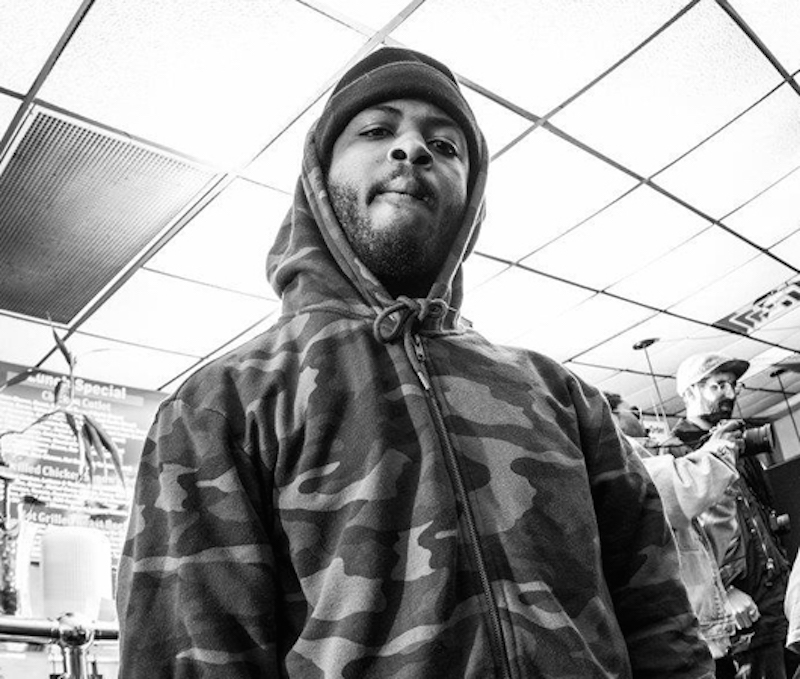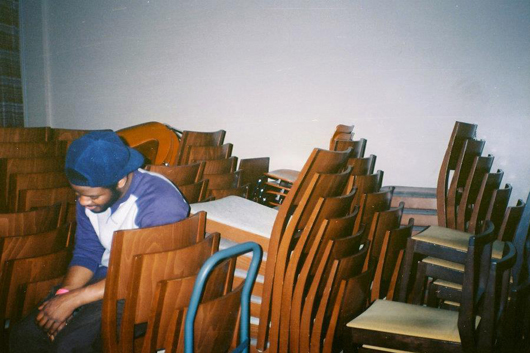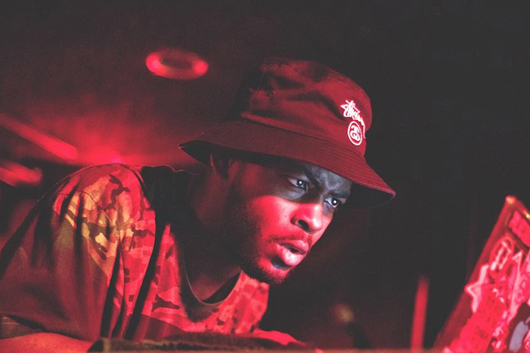Rapper Proof: How Hardworking LA Beatmaker Knxwledge Became the Most Known Unknown Producer in the Game
After a long pause, Glenn Boothe responds, “I’d say probably half a million.” He’s seated […]

Rapper Proof: How Hardworking LA Beatmaker Knxwledge Became the Most Known Unknown Producer in the Game
After a long pause, Glenn Boothe responds, “I’d say probably half a million.” He’s seated […]

After a long pause, Glenn Boothe responds, “I’d say probably half a million.” He’s seated at his desk surrounded by strewn-about records, a poster emblazoned with the word “BEATS,” stacks of unmarked cassette tapes, and a tousled bed, and behind him, the LA sun shines through his basement window, backlighting his slumped silhouette and accentuating the smoke that wafts from the second joint he just finished rolling. Boothe’s answer is suprising, and it comes after we’ve spent over an hour talking via Skype about his work as Knxwledge, the handle he uses to prolifically—some might say incessantly—drop his brand of soul-drenched instrumental hip-hop on Bandcamp and, with considerably less regularity, labels like Stones Throw, Leaving Records, and All City. It seems like a totally improbable number, but then again, his estimation brings to mind something the producer said at the very beginning of our interview: “I’ve been making beats since I can remember.”
Born and raised in central New Jersey, Boothe was one of three boys in a church-going family full of singers and musicians proficient in just about every instrument available to them. “My mom and dad would clean the church every weekend,” he says of his childhood, “so I’d have access to every instrument that was there. And the [church] musicians all had to get new instruments, so I would just take all the old instruments.” Inspired by early Nas (“the grimy soul-sample joints”) and ’90s R&B, the nascent, self-taught artist began to put together a ramshackle set-up and make his own recordings at the tender age of 11. “I was trying to make hip-hop shit from the gate,” Boothe tells us with staunch conviction. He elaborates, “They used to record the sermons in church, and have these stacks of tapes. They had like 15 minutes on each side, and I’d bring a 303 to church and record it straight to tape.” Surprisingly, many of these early tracks still exist, and sporadically appear on his new releases. Even Knxwledge’s brand-new second LP for All City, Kauliflowr, features elements of recordings from “way back when.”
It was still sometime after his youth that Boothe began to make a name for himself in any real capacity. During those formative years, he enrolled in the computer-sciences program at Cheyney College, a historically black university located just outside of Philadelphia, and begrudgingly maintained a job at J. Crew. Keeping busy as ever, though, he continued to make beats and upload them to his profile on the once-ubiquitous MySpace, which is how Olan O’Brien of Dublin’s All City label came to “randomly” get in touch with the artist. And to hear it from Knxwledge, the match couldn’t have been any more perfect. “All City is just the truth to me,” he says. “Olan is like the epitome of New York hip-hop. He’s a very wise individual.” It was a pairing that began to elevate Boothe’s visibility as a producer, got him out to Ireland for the first time, brought about his debut LP, Klouds, and set the ball rolling for what might have been Knxwledge’s most important choice as an artist, his move to Los Angeles.
“I was in between my second semester of my first year of college, and I came out [to California] for my first show at San Diego University,” says Boothe, telling us how he wound up on the West Coast. “[The lineup] was me, Samiyam, Gaslamp Killer, House Shoes, and Danny Brown—it was ridiculous. After that, I was like, ‘That’s it.'” But on returning to Philly, the producer still had his school and work obligations to deal with, which he did without second guessing himself. “I got scheduled to work an overnight shift [at J. Crew] on my birthday, and something just hit me inside. I thought, ‘Man, I’m not supposed to be out here.’ And I just didn’t show up to work, and moved out here like the week after. I’ve been out here ever since.”
In a typical coming-of-age story, this would be the part where our protagonist flies into the sunset with an MPC under his arm and a dream under his fitted cap, and we let the credits roll. But for Knxwledge, touching down in LA was the real start of his story, the place where he could fully inhabit the lifestyle of his craft. It’s the place where he—like many other up-and-coming beatmakers—would find constant inspiration in the fertile music scene surrounding Daddy Kev’s Low End Theory party, where he could pal around with the likes of Samiyam, The Alchemist, and Jonwayne, and where he could link up with Matthewdavid’s Leaving Records and the iconic Stones Throw label (another keeper of the “truth,” as Boothe puts it).

Maybe as a stroke of luck, Boothe also happened to move into a place within spitting distance of Amoeba Records. “That’s my number one,” he says about the trove of dusty vinyl before continuing, “I spend a lot of time there.” Knxwledge tells us this in earnest, but the significance the record store plays in his creation process can’t be overstated. When we ask him about his daily routine for making beats, the producer explains, “I wake up, go to Amoeba, see what’s in front, see if they got any new $.50 acapellas of anything trill… Then I’ll go all the way back to the lounge, and grab like $20-worth of dollar joints.” He goes on, “Then it’s just back [home], looping [record samples] while I’m chopping stuff on my Livid controller. Then I’ll usually record it back to my four-track Tascam, and play it through this little bad boy.” Boothe holds up a modest-looking cassette boombox with one big speaker on the front, showing off his big, friendly smile while a Kanye West track plays from the radio.
“It’s pretty much an everyday thing,” he says about his unstoppable production schedule. “I’d say it’s the best habit, but it’s probably the worst habit.” Then he pauses in thought, and decides to reword his sentiment. “It’s like a plants-with-no-sun kind of thing. I start to feel like I’m dying if I can’t make music.” And that could be the first clue towards explaining how Knxwledge boasts 56 separate “tapes” on his Bandcamp, each with a tracklist ranging anywhere from one to 22 songs in length. Simply put, the guy is a powerhouse, a ceaseless creator who refits massive quantities of soul, R&B, boogie, funk, and jazz-fusion records from the ’70s and early ’80s (“I don’t go past ’81,” he’s sure to specify) almost exclusively for his blunted tracks—collecting the quick sketches in an array of series with titles like Hexual.Sealings, karma.loops, and WrapTaypes.
To reiterate: Knxwledge releases an astounding amount of music online, so much that even his peers sometimes tell him to rein it in. Boothe gives us an illustration, “Some people say to me, ‘Yo, why’d you post that shit? That joint’s hard!’ And I’m like, ‘It’s cool. Whatever, it’s just a beat. I’ll make another one, and another one.'” He sounds cooly assured as he talks about how much he works, maybe even slightly overconfident, but then he holds up a terabyte hard drive, saying, “I have literally six of these things.” He continues, “[The music] just needs to be shared at the end of the day. There’s no reason for it to be sitting on my hard drive.” But as anyone who has taken even a cursory glance at Boothe’s Bandcamp knows, the producer isn’t exactly giving his beats away. There’s not a single “free” or “name-your-price” download available for any of the 56 different collections. Each track costs $1—no exceptions. It’s a far cry from the usual dealings of independent artists desperate to get their music out in the world, but Knxwledge wouldn’t have it any other way. “I feel like everything is worth something. Everything is worth somebody’s time if they’re putting it out there,” he says, sounding as if he’s reading from his own list of personal principles. “I feel like a dollar [for each track]—and I’m not even getting a whole dollar—is justice. If you’re an actual human being in America, and you love it—as much as I love it, apparently—then it could come out of your pocket.” Boothe takes a second to hit his joint before finishing up plainly, “I buy music. And at the end of the day, the greenery is a necessity.” (We assume there’s no pun intended.)
And yet, for a guy who is dropping a digital tape seemingly every week or two, Knxwledge’s physical releases are unusually sparse. Not counting last year’s Buttrskotch cassette for Leaving Records and the 53-track Anthology double-cassette that appeared via Stones Throw this year, Boothe only has two “official” albums, the latest of which wasn’t released until three years after its predecessor. Obviously, the gap in time wasn’t a product of laziness or writer’s block, but was actually a matter of planning. “If you’re gonna do it, you have to do it right,” the artist explains about readying his LPs. “And you have to do it with precision, with cats that have serious stature in the game.” It’s apparent how much he reveres the vinyl format when listening to his dense and vibrant records, as each quick tune on those releases seems to come already imbued with grit, age, and analog warmth; comparisons to the Southern California lineage of beatmaking (i.e. Madlib, J Dilla, and Flying Lotus) can be readily and aptly made. Boothe reveals that the consistent quality is no accident when he says, “Wax is more of a super solid situation, and there are beats that I actually save for wax.” The brand-new Kauliflowr LP is no exception, as some of the 18 tracks which comprise its 35 minutes were made as far back as 2000. But how does he know when a tune is going to go digital or be set aside for vinyl? “There has to be the right feeling,” he answers. “There’s something about melodies to me. I’m very melody driven, so it has to be able to be on loop for… forever.”

With so much instrumental material already under his belt, Boothe is now venturing for the first time into the realm of producing beats for rappers on his appropriately titled 10″ series for All City, Rap Jointz. The first volume—featuring tracks with QuelleChris, Blu, and Dudley Perkins—is already available, with presumably more to come. Even still, the artist seems particularly apprehensive about the whole thing. “I hated the idea of people rapping over my stuff,” he tells us with a certain amount of indignation. “I understand it, but it’s crazy for someone to just go out of their way and rap on my shit.” Taking things even further, the producer says, “I’m just really into the artform of letting the music be on its own, with little interruptions so that maybe somebody can’t just freaking rap on it. I try to make it rapper proof.” He slyly laughs to himself at the thought, but when we ask him to name three MCs he’d love to collaborate with, Boothe takes next to no time in answering definitively, “I got an album for Prodigy, I got an album for Action Bronson, and I got an album for Roc Marciano.”
We’re slowly wrapping up our Skype call when the topic of the local scene is broached. Knxwledge confides, “It’s a different game now,” sounding somewhat defeated in his tone. “Hopefully, it stays like it has always been, the ‘beat scene’ that is. Like everybody coming out to Low End, just little random shows being thrown every now and then…” He trails off on another one of his contemplative pauses, taking some time to assess all of the years he’s spent working tirelessly in his room and gigging around town and out of the country with friends. Eventually, Boothe comes back to us: “Everybody is still here, but everybody’s just in their lanes, doing their own thing. I guess there are still new things happening every day, but I don’t really hear about it. I guess I’m just in my box.” And as lonely or sad as the statement may sound, he doesn’t seem to mean it that way. The guy thrives on his constant workflow, somehow pulling inspiration from his own experiences in LA, on the East Coast, and abroad in Ireland or Russia—bringing that wisdom and spirit back to his “rapper-proof” beats, of which there seems to be no shortage. With his freshly lit joint leaving smoke trails on the screen, Knxwledge takes some time before answering our second to last question with absolute seriousness, “I’d say probably half a million.” It just has to be an impossible number, but without flinching he answers our final question: How many of those beats have you actually released? “Maybe a few hundred, probably not even that much.”

